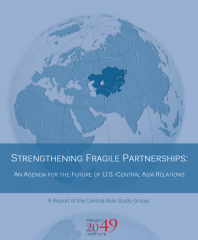
Strengthening Fragile Partnerships: An Agenda for the Future of US-Central Asia Relations

A comprehensive new report from the Central Asia Study Group and the Project 2049 Institute calls on American and Central Asian leaders to rise to the challenges and opportunities in the region. The report proposes an action agenda on economics, energy, governance, security, social development, and regional cooperation, and places particular emphasis on the importance of reconnecting Central Asian countries to the global economy. The United States needs to reassess its strategies and policies and reaffirm its commitment to remain engaged with the nations of Central Asia even as the U.S. draws down forces from Afghanistan.
Foreward and Acknowledgements
The following report presents a consensus view of the members of a bipartisan study group on U.S. relations with five Central Asian nations– Kazakhstan, Kyrgyzstan, Tajikistan, Turkmenistan, and Uzbekistan.
Recognizing the complex challenges that Afghanistan, as an essential part of Central Asia, presents for U.S. policy in the region, the report seeks to highlight opportunities for the United States to strengthen these other relationships. The study group believes that economic and strategic trends in the region warrant greater attention and broader engagement by the United States.
This report is not a political document and reflects the views of the study group members only. This is an attempt by the group to inject strategic direction into what its members believe are vital relationships in a region important to U.S. interests.
- Issues:
- Economics, Global and Domestic Governance, Natural Resources
- Regions:
- Asia, North America
- Country:
- United States
- Year Published:
- 2011
- Institution:
- Project 2049 Institute

